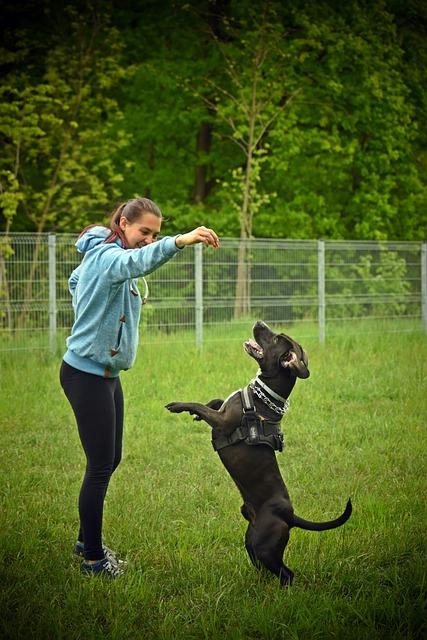Is It Ethical to Rely on Treats for Dog Training

In the world of wagging tails and eager paws, the bond between humans and their canine companions is often strengthened through the language of treats. These small morsels of delight can transform a distracted pup into a focused learner, seemingly weaving magic into the training process. Yet, beneath the surface of this treat-laden approach lies a nuanced ethical debate: is it truly right to rely on these edible incentives to shape our furry friends’ behavior? As we explore the intricate dance between motivation and manipulation, rewards and reliance, we delve into the heart of dog training practices to unravel the ethical implications of using treats as a primary tool. Join us on this journey as we balance the scales between the joys of positive reinforcement and the potential pitfalls of treat dependency.
The Temptation of Treats: A Closer Look at Reward-Based Training
When embarking on the journey of training our canine companions, the allure of using treats as motivators is undeniably strong. Treats serve as a tangible and immediate reward that dogs can understand, providing clear feedback for desired behaviors. The approach, grounded in the principles of positive reinforcement, is not just about indulgence but about building a bridge of communication between human and dog. This method can be particularly effective in teaching new commands or correcting unwanted behavior, as it taps into the dog’s natural inclination towards food and rewards.
However, it’s crucial to consider the implications of this training technique. While the benefits are clear, such as increased engagement and faster learning, there are potential downsides to be mindful of:
- Over-reliance: Dogs may become dependent on treats and refuse to respond without them.
- Health Concerns: Excessive treats can lead to weight gain and nutritional imbalances.
- Behavioral Issues: Dogs might learn to expect a treat for every action, potentially undermining intrinsic motivation.
Finding a balance is key, integrating treats as part of a broader strategy that includes verbal praise, physical affection, and play. This holistic approach ensures that the training remains ethical and effective, fostering a deeper bond between you and your furry friend.

Balancing Bribery and Motivation: Ethical Considerations in Canine Education
In the realm of canine education, the use of treats as a training tool often sparks a complex dialogue about ethics and efficacy. On one hand, treats can serve as a positive reinforcement, helping to establish a strong bond between dog and trainer. They offer a tangible reward for desired behaviors, potentially accelerating the learning process. However, it’s crucial to strike a balance to ensure that reliance on treats does not undermine the intrinsic motivation of the dog to learn and obey.
- Pros: Treats can enhance motivation, provide immediate feedback, and foster a positive learning environment.
- Cons: Over-reliance might lead to dependency, where the dog performs only for treats rather than understanding the behavior’s intrinsic value.
Ultimately, the ethical use of treats in dog training lies in moderation and the gradual transition from external rewards to internal satisfaction. Trainers should aim to blend treats with other forms of positive reinforcement, such as verbal praise or playtime, to create a holistic and sustainable training approach. This ensures that the learning experience remains enriching and ethical for our canine companions.

Understanding Canine Psychology: Are Treats Truly Effective?
Delving into the realm of canine psychology reveals a fascinating landscape where instincts and learned behaviors intertwine. Treats, often used as a tool in dog training, tap into a dog’s natural motivations, primarily their love for food. However, the efficacy of treats as a training method can vary significantly based on several factors. For one, the timing of the reward is crucial—immediate reinforcement helps in associating the treat with the desired behavior. Furthermore, the type of treat can influence outcomes, with high-value treats often yielding better results during challenging training sessions.
Despite their apparent success, the reliance on treats raises ethical questions in the training community. Some considerations include:
- Dependency: Over-reliance on treats may lead to a dog performing tasks only when food is involved, which could undermine intrinsic motivation.
- Health Concerns: Excessive treat consumption can contribute to obesity and related health issues.
- Behavioral Impact: Treat-based training might inadvertently encourage undesirable behaviors if not carefully managed.
In the nuanced world of canine psychology, the use of treats must be balanced with other training methods to ensure ethical and effective learning.

Beyond Treats: Alternative Strategies for Positive Reinforcement
When it comes to training our furry companions, the focus often falls on the almighty treat. However, there’s a world of alternative strategies that can be equally effective in reinforcing positive behaviors. Praise and affection stand out as a powerful tool. Dogs are social creatures that thrive on attention and love from their humans. A simple “good boy” accompanied by a belly rub can work wonders in encouraging desired actions.
- Playtime as a Reward: For dogs that are more motivated by play than food, engaging in a quick game of fetch or tug-of-war can be a fantastic reward.
- Interactive Toys: Consider using puzzle toys that dispense kibble or toys that engage their natural instincts. These not only provide mental stimulation but also serve as a reward.
- Freedom and Exploration: Allowing your dog some off-leash time in a safe environment or granting them access to sniff and explore during walks can be a highly motivating reward.
Incorporating these alternatives can create a balanced approach to training, enriching the bond between you and your pet while keeping their minds and bodies engaged. Remember, the key lies in understanding what truly motivates your dog beyond the simple allure of a tasty treat.



